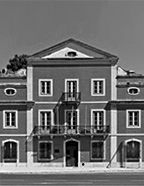

................................
Historiography
I
Closely tied to the virtue of patriotism was historical justice. In the opening speech of the Academy sessions in 1938, António de Vasconcelos chose the figure of King John V, founder of the Royal Academy of Portuguese History, working to defend this virtue. "The birth of this Portuguese Academy of History will carry on the glorious traditions of its predecessor, the Royal Academy of Portuguese History, which emerged in the 18th century at a very interesting and vibrant time, protected by the dedicated and effective action of great King John V, who worked so hard for the greatness of Portugal, who supported and propelled Arts and Letters and the whole life of the Nation with maximum effort. It took a whole century of criminal demolition, of History's appalling falsification, to dim the intense brightness of his reign. Today, fortunately, through the persistent and laborious pursuit of sources, History is being purified, and justice is being done to the magnanimous leader of the Nation, the very King John V himself" (APH, Bulletin 1937-1938, 172-173). Historical justice often primarily seeks to restore the greatness or virtue of an event or actor. If the purpose of an institution is to understand the Nation, most of the time the Nation will be restored to its greatness. Historical justice was thus nationalised, not least because the Nation was the object of study. Hence, the meaning of "defining historical truth in the national interest" may be understood.
Having already examined the ethos of the institution and taking it as a starting point, the contrasts and conflicts within the Academy may now be explored. The most defining conflict of the subsequent decades within the institution occurred in the late 1940s between Alfredo Pimenta and the Academic Council. Pimenta had always been a particularly independent member of the Academy, in addition to having a contentious and confrontational personality. Unlike most of his fellow members, Alfredo Pimenta was a public figure who frequently fuelled controversy in the press, and was also Salazar's personal correspondent (Braga da Cruz, Salazar and Alfredo Pimenta, 246-331). This afforded him a reserve of social capital, in addition to the cultural capital derived from his written work, which gave him independence and power.
